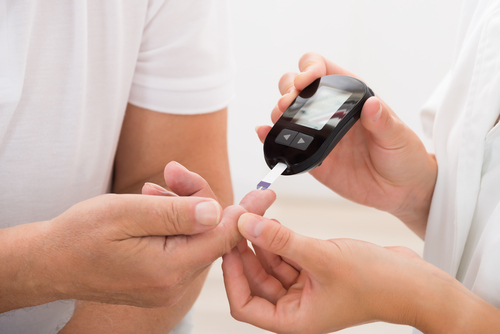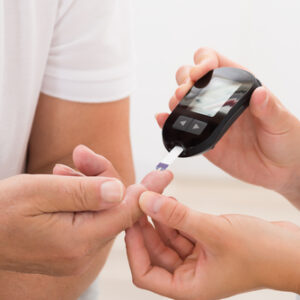What does HbA1c mean?
HbA1c is formed when a usual haemoglobin that carries oxygen to different parts of our body joins with the glucose in the blood and becomes glycated. The HbA1c test is a test that is used to determine your average blood sugar levels over the past few months. The test for HbA1c is used to diagnose and monitor diabetes. For people who have diabetes, the test is used to indicate how well the diabetes has been controlled over the last few months. People with diabetes are advised to have this test every 3 to 6 months, or more frequently if it is not under control.
The higher the HbA1c, the greater the risk of developing complications such as problems with your eyes and kidneys. The main difference between a HbA1c test vs Blood Glucose testing is that HbA1c provides a longer-term trend, similar to an average, of how high your blood sugar levels have been over a period of time whereas Blood glucose level is the concentration of glucose in your blood at a single point in time, i.e. the very moment of the test.
What is the normal range of HbA1c level?
For people without diabetes, the normal range for the haemoglobin A1c level is between 4% and 5.6%. Haemoglobin A1c levels between 5.7% and 6.4% mean you have prediabetes and a higher chance of getting diabetes. Levels of 6.5% or higher mean you have diabetes.
What could cause a high or low HbA1c level?
The causes for a high haemoglobin A1c level include suffering with obesity, diabetes, heavy smoking, deficiency of iron and vitamin B12, folate deficiency(vitamin B9) anaemia, certain chronic diseases such as gum disease, sleep disorders, heavy alcohol consumption, inactivity, possibly genetic haemoglobin disorders and certain drugs/medications as well. Patients suffering with severe diabetes for a long time period are most likely to have rather high HbA1c levels.
Whereas, the common causes for a low HbA1c levels usually include certain conditions that are responsible for destruction of red blood cells in the body which is also called haemolysis, heavy alcohol consumption, chronic liver disease, pregnancy, genetic haemoglobin disorders and certain drugs and supplements. Genetic haemoglobin disorders and heavy alcohol consumption are the main causes.
What happens if my HbA1c level is high?
High HbA1c indicates that the glucose level in the body is uncontrolled. The excess sugar in the blood damages different organs of the body. If left unmanaged, excess sugar can lead to several complications. If you are receiving values higher than 7.5%, it should warrant you to take necessary action to lower your glycosylated A1c. Here are some of the problems that you may encounter if you fail to reduce it to normal levels:
Kidney Disease
Nephropathy or damage to the kidneys is one of the most common complications of high HbA1c. The kidneys suffer the most such that many patients end up with end-stage kidney disease. They either require dialysis or worst, a kidney transplant may be the only resort left.
Cardiovascular Disease
Atherosclerosis which is characterized by the hardening of the blood vessel walls makes patients prone to heart diseases. Patients with higher HbA1c experience hypertension and are at higher risk for heart attack.
Blindness
Uncontrolled blood glucose level leads to damage in the tiny blood vessels supplying the eyes. The result can be devastating since many of the patients experience blurring of vision until eventually, they will lose their sight. Among diabetics, uncontrolled blood glucose is the leading cause of blindness. The best way to protect your eyesight is to keep your glucose level within the recommended target range and as close to normal as possible.
Nerve Disorder
Tingling and loss of sensation in the feet and hands are some of the common symptoms of uncontrolled blood glucose levels. If the level of HbA1c remains uncontrolled, the nerves become damaged and patients become more prone to injuries.
Fatigue
Contrary to what is expected, people with too much supply of glucose in the body get easily tired. The excess glucose is not properly metabolized to become energy. As a result, simple activities can be too tiring for most patients. Fatigue is a common health problem among diabetic patients which can eventually impact their quality of life.
Bone Loss
Age is a known predictor of bone loss and recently, bone mineral density has been correlated as a risk factor for increased HbA1c.
Cancer
Cancer cells feed on sugar. Their fast metabolism and uncontrolled cell division require food and other nutrients. For as long as there is an excess in the sugar, they have the raw materials to keep on multiplying. Different types of cancer do well in patients with uncontrolled HbA1c.
How can you lower the HbA1c level?
One can easily maintain healthy haemoglobin A1c levels by keeping a tab on their nutrition, diet and by practicing a healthy lifestyle. Staying active by doing regular workouts and cardio exercises can help a lot in maintaining a normal HbA1c count. Eating a full and balanced diet enriched with healthy carbs, fats, proteins, vitamins, foods rich with fibres and whole grains can lower the HbA1c levels.
Experts advise filling about half your plate with vegetables that are low in starch, such as carrots, greens, zucchini, or tomatoes. One-quarter of your plate should be a lean protein like chicken or tofu, and the last quarter should be whole grains like brown rice or quinoa. Avoid foods high in starch, carbs and sugars. Another utmost important responsibility is to have regular check ups and monitor your blood sugar level regularly. It is also crucial that you get rid of habits like smoking and heavy alcohol consumption.






